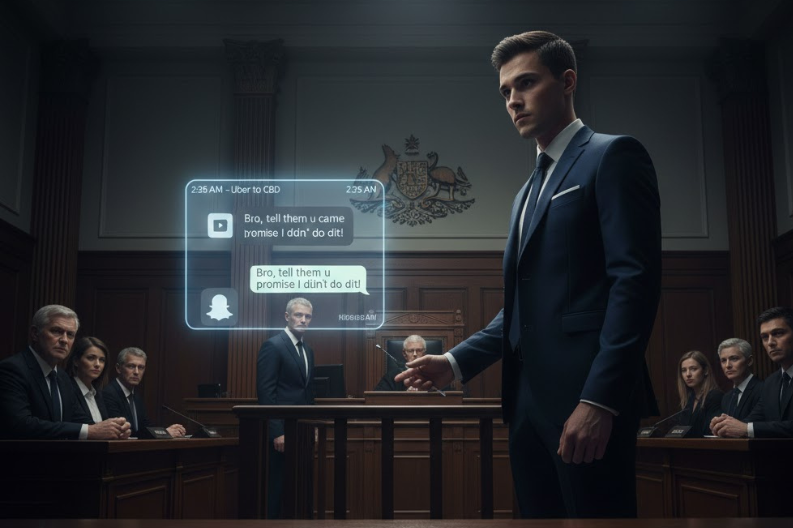An accused man from high-profile family on trial for rape appeared in Victoria’s County Court on Monday for the start of his two-week trial. The man, who cannot be identified for legal reasons, has pleaded not guilty to two counts of rape. Prosecutors allege he digitally raped a woman while pretending to be someone else, then tried to cover up the incident by fabricating evidence.
Crown prosecutor Jeremy McWilliams outlined the allegations against the accused during opening statements. He told the jury that the alleged rape occurred at the man’s Melbourne home in the early hours of January 14, 2024. Furthermore, McWilliams explained that the woman did not experience force or threats. Instead, prosecutors claim the accused used deception to commit the alleged assault.
The jury heard that the alleged victim was friends with the accused man’s girlfriend. Additionally, she had a casual sexual relationship with another friend of the accused. On the night in question, the accused’s girlfriend invited the woman to join them at the house shortly after midnight.
The four young people spent time together socializing and drinking. Indeed, the accused had been drinking and playing beer pong with friends since the previous afternoon. Eventually, they headed separately to bed around the same time.
According to the prosecution, the alleged victim and her casual partner had consensual sex in one of the bedrooms. Subsequently, the man organized an Uber to leave the property. Moreover, he departed shortly before 2am, leaving the woman alone in the bedroom.
McWilliams alleged that the accused then entered the woman’s room with a false story. Specifically, he told her that her partner’s Uber had been cancelled. Additionally, he claimed the man would be back upstairs in a couple of minutes because he couldn’t get another ride.
“None of that was true,” McWilliams told the jury emphatically. Meanwhile, the woman remained in the dark bedroom, believing what the accused had told her.
A short time later, prosecutors allege the accused returned to the darkly-lit room. Furthermore, he climbed into bed with the naked woman and inserted his fingers into her vagina. However, the woman became startled and asked for the activity to stop.
The woman’s suspicions grew that something was wrong. Consequently, she asked directly if it was the accused man. Nevertheless, he allegedly claimed he was her partner and attempted to reassure her.
Prosecutors claim the accused then grabbed both the woman’s hands. Subsequently, he allegedly digitally raped her again while she told him to stop. However, she managed to get one hand free and felt his hair, which was longer than her partner’s hair.
At that moment, the man allegedly stopped immediately and ran from the room. Nevertheless, he returned a few minutes later, leaving the door open and the hallway light on. Additionally, he allegedly acted as if nothing had happened.
“Are you OK? What’s happened?” the accused allegedly asked the woman. In response, she told him she knew it was him because he was the only other man in the house. However, the accused continued to deny entering the room.
The woman left the house in an Uber around 2:20am. Moreover, before she arrived home, she started telling people what had happened. Specifically, she contacted the accused’s girlfriend, her mother, and two close friends. Indeed, at 3am, less than an hour after the alleged rape, she told her mother she had “been raped by her friend’s boyfriend.”
Three days later, the woman reported the incident to police. Additionally, she recorded a phone conversation with the accused with police assistance. During this call, prosecutors allege the accused told her that her partner had confirmed coming back into the room. Furthermore, he allegedly pressed her to “move on with her life and forget about it.”
The prosecution presented additional evidence regarding a fabricated Uber receipt. Specifically, they allege the accused doctored the receipt early the next morning. Moreover, this fake receipt made it appear that the woman’s partner left the home after 2:30am, rather than before 2am.
McWilliams suggested the doctored receipt aimed to create deception. Furthermore, prosecutors claim it was intended to make the situation appear as if the other man was present during the alleged assault. Additionally, the accused allegedly sent Snapchat messages to his friend, urging him to say he returned to the room when his Uber was cancelled.
Defense barrister David Hallowes SC strongly contested these allegations. He told the jury his client did not sexually assault the woman. Moreover, Hallowes argued that the accused did not engage in any deception regarding the events.
However, Hallowes conceded his client did create the false Uber receipt. Nevertheless, he urged jurors to consider explanations consistent with innocence. Specifically, he suggested it might simply be ‘a young man panicking when someone makes allegations about something he didn’t do.’
Hallowes emphasized a key dispute in the case. Specifically, he questioned whether the woman’s partner ever left the room and returned before taking his Uber. Additionally, he told the jury that when the woman claims the accused touched her, “we say she’s got that wrong.”
Judge Gregory Lyon issued stern warnings to the jury at the trial’s start. Specifically, he repeatedly told jurors they should not search any names connected to the case. Furthermore, he warned them not to talk to anyone else about the evidence. Additionally, Judge Lyon stated he would refer jurors to prosecutors for potential criminal charges if they violated these instructions.
The accused man from high-profile family on trial for rape faces serious allegations, with the defense maintaining his innocence while the prosecution presents evidence of deception and fabricated documents in the ongoing two-week trial.



